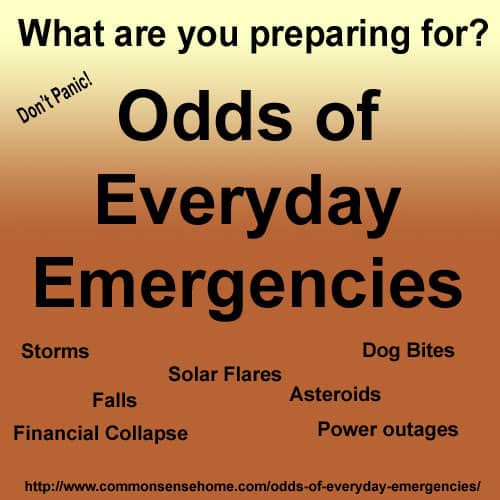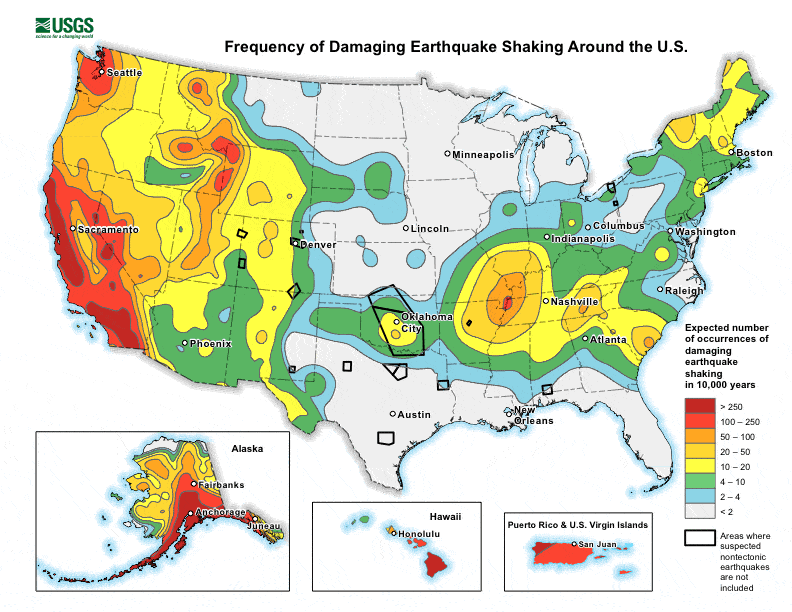What are the Odds of Everyday Emergencies?
This post may contain affiliate links. Read my full disclosure here.
Why should a person be prepared for emergencies? There are many possible reasons for an emergency. Some emergencies feel likely but in reality are extremely rare. It can be tempting to get caught up in prepping for fire, hurricanes, nuclear bombs and many other things. We want to focus on things that are likely – things that we should prepare for.

We’ve made a list of risks and how likely they are. This list is based on the National Safety Council website and other sources from around the web. The “odds” or likelihood numbers are estimates only, just to give you a feel for what’s real and what’s hype.
Table of contents
- What Are You Preparing For? Odds of Everyday Emergencies
- What are the Odds of War?
- What are the Odds of Financial Collapse?
- What are the Odds of an Electro Magnetic Pulse (EMP) as the result of a nuclear weapon going off?
- What are the Odds of a Major Solar Flare Hitting the Earth?
- What are the Odds that We Will Run Out of Natural Resources?
- What are the Odds of a Major Power Outage Taking Out a Large Section of the Electrical Grid?
- Conclusion
- Related Articles
What Are You Preparing For? Odds of Everyday Emergencies
Hurricane 1 in 3 in affected coastal areas
Get Heart Disease 1 in 6
Get Cancer 1 in 7
Experience a major Solar Flare 1 in 8 by 2030 see below for more info
Have a Stroke 1 in 29
Die from intentional self-harm 1 in 95
Die in a motor vehicle incident 1 in 114
Unintentional poisoning by and exposure to noxious substances 1 in 126
Falls 1 in 127
Assault by Firearm 1 in 370
Car occupant death 1 in 647
Pedestrian death 1 in 701
Motorcycle rider death 1 in 985
Accidental drowning and submersion 1 in 1,103
Death from exposure to smoke, fire, and flames 1 in 1,344
Dying from choking on food 1 in 3,461
Cyclist death 1 in 4,381
Dying from the Flu (influenza) 1 in 6,000
Death from Firearms discharge 1 in 6,609
Air and space transport death 1 in 7,178
Death from exposure to atomic current, temperature, and pressure 1 in 12,420
Death from exposure to excessive natural heat 1 in 13,217
Being murdered 1 in 18,000
Death from cataclysmic storm 1 in 66,335
Death from contact with hornets, wasps, and bees 1 in 79,842
Death from earthquake and other earth movements 1 in 97,807
Death from legal execution 1 in 111,779
Bitten or struck by dog 1 in 144,899
Odds of dying in a Tsunami/Flood 1 in 558,896
Odds of an asteroid or meteor killing you directly 1 in 625,000
Death from fireworks discharge 1 in 652,046
Death from lightning 1 in 700,000.
Dying from the plague is 1 in 3,000,000 – depending on where you live.
Dying from parts falling off an airplane: 1 in 10,000,000
Zombie apocalypse: 1 in a billion to 1 in 10 trillion depending on your definition of it as a disease
Some events are much harder to predict. Some might occur but only on the other side of the planet. Some are location specific, coastal areas, or near a volcano. To make things more complicated the odds don’t always tell the story. Each of us may have a higher chance to die in a flu pandemic, super volcano or global pandemic, because of the widespread total threat of the larger events and the collective number larger events.
What are the Odds of War?
Calculating the likelihood of local, regional or global wars is hard. Given human history and current behavior of governments around the world, the odds, unfortunately, are increasing. Add in terrorism and the odds of a small impact to your life from war somewhere are greater than 1 in 10, depending on the time period in question.
A larger widespread man-made disaster impacting fuel prices are probably in the 1 in 20 to 1 in 50 range. Smaller conflicts around the globe have been letting off steam since the WWII. Over the past decade antagonism has been building up between many groups around the world. A big example is radical Islam and anyone who opposes it. Increasing demand of growing populations for land and resources will also raise tensions.
Aren’t earthquakes just in California?
Simple answer no. The USGS shows multiple hot spots for earthquakes across the USA

Even areas that show lower earthquakes have some. As an example, Minnesota a very low number of earthquakes. But Minnesota still had 20 small to moderate earthquakes since 1860!
What are the Odds of Financial Collapse?
Financial collapse has happened many times before, with smaller short term recessions and full blown depressions. We are seeing major financial problems periodically throughout the world. Combine financial instability with increased instability in the middle east and you increase the odds of at least a global recession if not a full global financial failure.
Add a full war into the mix and the odds go way up. Many people believe it is almost inevitable that we will see massive inflation based on government spending and monetary policy from 2005 through 2017.
Even if its not the end of the world, we can expect some serious financial events because of government deficit spending, the same thing that would happen if we spent more than we had individually (just multiply it by billions of dollars).
What are the Odds of an Electro Magnetic Pulse (EMP) as the result of a nuclear weapon going off?
Many preppers fear this attack. We agree it would be serious. What does an EMP do? If a nuclear bomb were exploded high in the atmosphere over the east coast, nearly that entire area would be without power in a few minutes. The EMP doesn’t hurt people directly, but an EMP can damage/destroy electronics within range of the pulse. The odds of an EMP attack are probably comparable to a lighting strike or global war, so it’s unlikely but not impossible. The recovery time for an EMP could be weeks, months or years, depending on the scope of the attack and the scope of damage to the electrical grid nationally.
See Electromagnetic Pulse (EMP) – What You Need to Know for more information.
What are the Odds of a Major Solar Flare Hitting the Earth?
A major solar flare or large Coronal Mass Ejection (CME) would be similar to the EMP from a nuke. The question is, “How big it might the CME be?” Solar flares hit earth regularly, and odds are that a big one will hit earth eventually. The question we can’t answer is when and how big. A big one solar flare could occur anytime, or not occur for another 300 years.
The Carrington coronal mass ejection (major solar flare) occurred in 1859 for multiple days impacting the entire planet. The results: telegraph wires burst into flames, touching off fires (while in other cases fire crews were called to fires that did not exist, due to the fiery lights in the sky). Telegraph machines scorched paper printouts, stunned operators with atomic shocks, transmitted gibberish, and continued working for hours even after being unplugged from the batteries that powered them. For two days, the light show and electromagnetic storm continued, then faded. Even at this lower level it would be devastating to our modern electronic environment. A tiny solar flare event caused Toronto to be without power for an entire day in 1989. Again the odds of this are hard to predict but over a 10 year period, the likelihood is as high as 1 in 8. Source
Would you like to save this?
Related Article: Electromagnetic Pulse (EMP) – What You Need to Know
What are the Odds that We Will Run Out of Natural Resources?
There are groups of people who believe we will run out of natural resources (iron, wood, water…) fill in your favorite item. This might even apply to food which is more logical as food production varies with weather which is quite hard to predict, much less control.
Two years of even minor interruptions in food production would impact global food prices. Make the interruptions medium or large and it would be equal to or worse than a global economic collapse. This is a serious area of concern. Improvements in reducing waste should be made, as well as developing new, lower impact technologies to use resources more wisely, and to recycle existing waste.
The odds are 100% that you will get older. Therefore, building your home or modifying your home to better fit you as you age is a good investment. Think “Cradle to Cradle” design. For more information see our article: Aging in Place – Making Your Home Livable for a Lifetime
What are the Odds of a Major Power Outage Taking Out a Large Section of the Electrical Grid?
These are hard to predict, unless they are widespread (see Solar Flare / EMP). Regardless of the big events, small interruptions in service are likely and actually likely to get worse given an aging power system, power plants being retired without compensating power generation increases and overall economic problems. If the electricity isn’t working in your house and you don’t have light, water or heat, it really doesn’t matter why. Check out our post on Emergency Power Options for ideas on how to keep the basics powered up when the grid goes down.
For more information regard grid failure see our post When the Power Grid Fails – 10 Things You Need to Prepare
A good related article about the mathematical odds: https://medium.com/s/story/the-surprisingly-solid-mathematical-case-of-the-tin-foil-hat-gun-prepper-15fce7d10437
Conclusion
Collectively this information can seem overwhelming, but if you focus on covering the basics, you’ll be ahead of many people. Stock at least a few days of food and water, and have a extra fuel in case of a storm. Add more from from there. Balance all the crazy input with what you know to be reasonable, trust your gut.
Related Articles

This post was written by August Neverman IV. August has a strong background in emergency preparedness. He served on several emergency preparedness teams during his tenure at Brown County WI Government, the Medical College of Wisconsin, HSHS, a 13-hospital system and emergency response training during his time with the Air Force and Air National Guard. Learn more about August.

The real chances of getting cancer, according to the American Cancer Society,
Males — 47%
Females — 38%
Malfunction of the heart and circulation system will kill 40% of Americans
We should worry most about our lifestyles and diets, and take the necessary steps to prevent these problems.
You got it! Localized issues and economic collapse.
The way our economy is going and with China selling oil using the Yuan, once we lose the petrodollar it won’t be long before a financial collapse. I think thats our biggest threat right now.
I’d have to agree. That, and localized natural disasters.
Well, the odds of a Zombie Apocalypse are certainly disappointing, but one can still dream, can’t one? Seriously, I was interested in the 1 in 126 chance of poisoning/noxious substances. No one has been more addicted to consumerism and disposability than I. That was two cases of e. coli and a third mysterious other form of food poisoning ago. From food contamination. Outside my home.
I like your section on solar and emergency power. I live in a metro area on the eastern seabord, and while we kept power during Sandy and this last storm, we were without power for a week after Irene. So, I’ve been in the market for more sustainable forms of living not because I loathe the infrastructure, or want to give it “the finger,” I just figure if I don’t know it’s unreliable by now, then I must not be as smart as my mama tried to raise me to be.